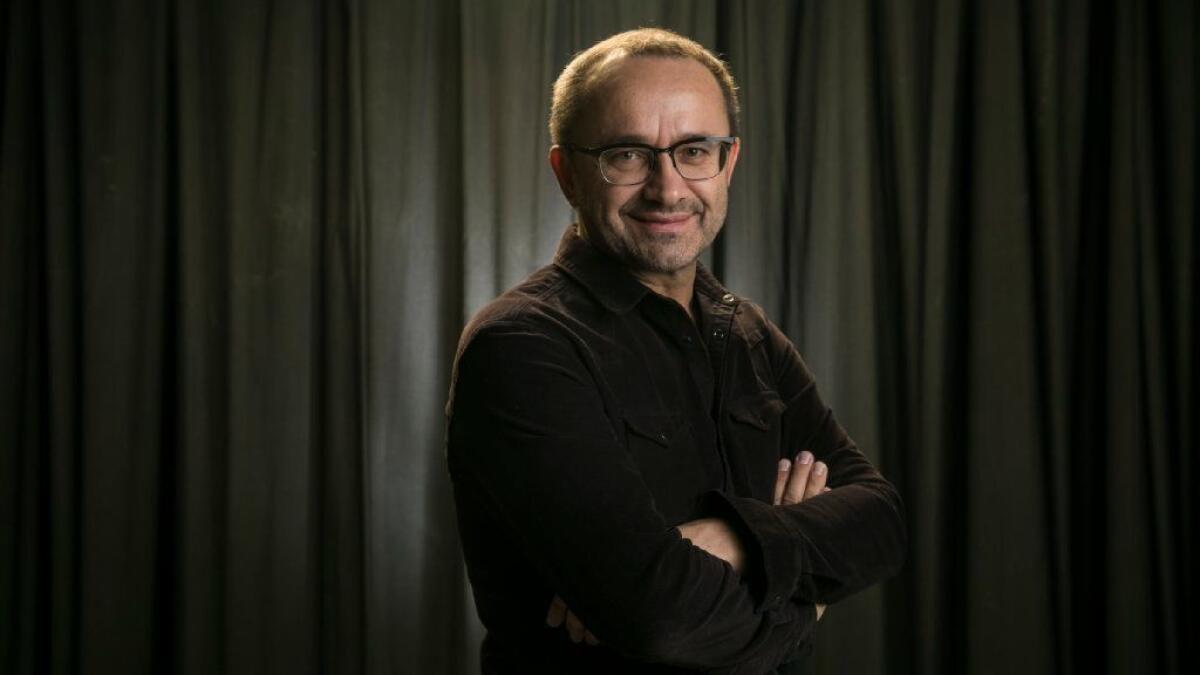‘Loveless’ takes a deep dive into how dispiriting the unraveling of family can be

- Share via
There is a moment in Andrey Zvyagintsev’s “Loveless” where a boy, Alyosha (Matvey Novikov), tries to keep quiet hiding behind a door as he sobs over the argument his parents are having in the other room. It’s a striking image that captures the pain children often experience during a divorce no matter what part of the world they live in.
For Zvyagintsev, casting the role of the boy was key to the contemporary drama as he needed an actor who could nail the scene without knowing too much about it.
According to producer Alexander Rodnyansky, casting was initially handled in a predictable fashion. In came 250 boys from Moscow and St. Petersburg for consideration. Eventually, they were whittled down to four.
WATCH: Video Q&A’s from this season’s hottest contenders »
At that point, they all auditioned for the door scene but were not told where it took place in the picture. Rodnyansky said, “They never read the full script. They never knew what was going on in the kitchen.”
Novikov was 12 years old during production, and although his mother is said to be quite happy with it, she still has not let him see the final film. Moreover, the youngster shot the scene with no context partially at Zvyagintsev’s insistence. Considering he nailed it in eight takes, unusually low for a filmmaker who prefers 30 to 40 for a scene, his method worked beautifully.
“It’s very obscene language, it’s very rude and a tough scene. I never wanted him to be inside of it,” Zvyagintsev recalls. “I proposed to him to imagine something he really dreams about and then to imagine that this dream is not going to come true. And he was so bitterly crying just take by take by something he just imagined. He’s very sensitive. I was saying, just stop and he immediately stopped and asked, ‘Was it good? Was it OK?’ It was completely fulfilled by the young boy.”
Zvyagintsev’s second film to be nominated for the foreign language Oscar after 2014’s “Leviathan,” “Loveless” centers on a couple, Zhenya and Boris (Maryana Spivak and Aleksey Rozin), who are in the throes of as nasty a divorce as any lower-middle-class Russian couple can have. One day after hearing the aforementioned fight between his parents, Alyosha disappears, and after investigators realize he hasn’t simply run away, a citywide search begins to find the boy in the forests of a wintry Moscow.
Besides the subtle melodrama that unfolds, the film is as much an allegory for the hope for political change in Russia as it is a deep dive into how dispiriting the unraveling of family can be.
The filmmaker didn’t use unconventional methods just with Novikov, however, but with the parents as well. Most of the film was rehearsed for weeks during the audition process, but when it came to a scene where Zhenya and Boris visit a morgue, the director purposely kept quiet.
“Usually, we do work with a huge amount of takes till the moment I get the feeling this scene is done. It could be 30, 40 or 50 takes. The scene in the morgue was just one take. They knew the lines and they read it,” said Zvyagintsev. “They were prepared, so we came to the set [and we warned] the actors they would pull back the sheet and they would see something. [Maryana] was so shocked she couldn’t even talk. Not because [of] what she saw there, both of them definitely knew this was created, but it helped her to imagine.”
While “Leviathan” was celebrated around the world, Zvyagintsev and Rodnyansky describe it as being “polarizing” in its country of origin. That affected the reception for “Loveless” as well even though it has received universally more critical acclaim.
“It was very difficult to fight with the reputation of ‘Leviathan’ with Russian viewers,” Zvyagintsev says frankly. “So many people considered it Russiaphobic and blasphemous and overly critical to Russia. And this attitude, of course, expanded to ‘Loveless’ as well.”
He pauses, smiles and then continues, “I believe in every country there’s this kind of audience that loves so called ‘very kind cinema.’ These viewers desperately want to see their extraordinary self-portrait. It’s like the mirror in ‘Snow White’ and when the mirror shows you the real world you need to break it up in small parts.”
More to Read
From the Oscars to the Emmys.
Get the Envelope newsletter for exclusive awards season coverage, behind-the-scenes stories from the Envelope podcast and columnist Glenn Whipp’s must-read analysis.
You may occasionally receive promotional content from the Los Angeles Times.









